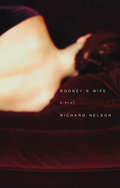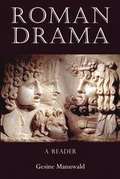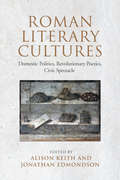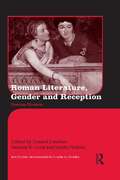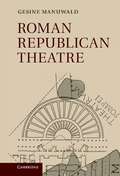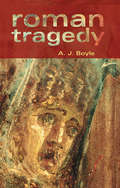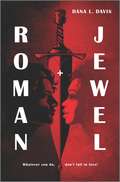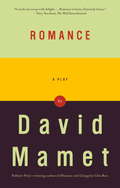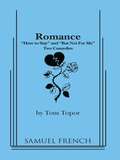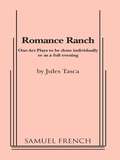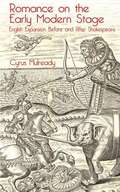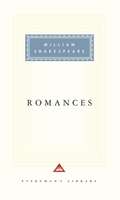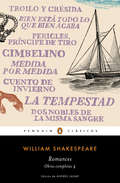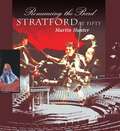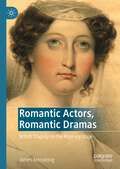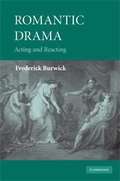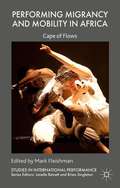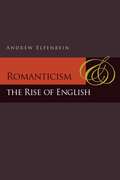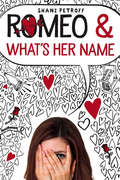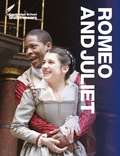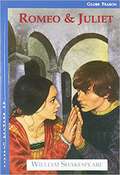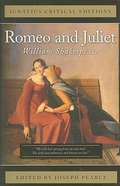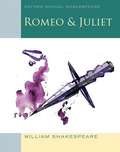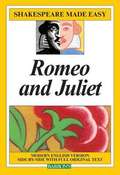- Table View
- List View
Rodney's Wife
by Richard Nelson"A full emotional geography of a family . . . Seemingly light conversation scrapes the skins of the characters in this sharply etched study of dislocation, loneliness and sexual betrayal."--Ben Brantley, The New York Times"Nelson is a master of the quiet detail, of the oblique rhythm that transforms emotional diffidence into fascinating character."--Linda Winer, Newsday"The early scenes proceed with the closely observed simplicity of Chekhov, whereas the later more wrenching moments evoke the eloquent bitterness of Albee."--David Cote, TimeOut New YorkA new work by leading American playwright Richard Nelson, who for more than 25 years has written prolifically, and with fine detail, on the perplexities of everyday living. In Rodney's Wife, a fading American actor in Rome for the filming of a 1960s spaghetti Western gathers with family and friends at a rented villa. Over the course of one booze-soaked summer night, jealousies and secrets are revealed that crumble the foundations of their relationships. Inspired by Euripides, the play is a tragedy of exiles who continue to need each other, even as they push away.Richard Nelson won Britain's Olivier Award for Best Play for Goodnight Children Everywhere, and the Tony Award for Best Book for his musical James Joyce's The Dead. His plays have been widely produced in the U.S. and Great Britain. He is an Honorary Associate Artist of the Royal Shakespeare Company, and Chair of the Playwriting Department at the Yale School of Drama.
Roman Drama: A Reader
by Gesine ManuwaldRoman drama is a genre of Latin literature that was influential both in the cultural life of the ancient Romans and in the European theatre tradition. Plays of Plautus, Terence and Seneca are still very well known today; yet there were numerous works by other poets besides, though they survive only in fragmentary form. On the basis of a selection of paradigmatic sample texts by a number of Roman dramatists, this anthology provides a stimulating overview of the entire literary genre, including its various subtypes (tragedy, praetexta, comedy, togata, mime) and its historical development. To make these texts accessible to a wide readership, new English translations (on facing pages) as well as introductions to the individual excerpts and to the general context have been included. A selection of relevant testimonia provides information about the cultural background to Roman drama and ancient views on this literary genre. Paradigmatic extracts from dramas written in England between the sixteenth and twentieth centuries illustrate the continuing influence of Roman plays. Thus this anthology conveniently documents the history of an interesting and exciting literary genre from its beginnings to the modern period.
Roman Literary Cultures: Domestic Politics, Revolutionary Poetics, Civic Spectacle
by Jonathan Edmondson Alison KeithDrawing on the historicizing turn in Latin literary scholarship, Roman Literary Cultures combines new critical methods with traditional analysis across four hundred years of Latin literature, from mid-republican Rome in the second century BC to the Second Sophistic in the second century AD. The contributors explore Latin texts both famous and obscure, from Roman drama and Menippean satire through Latin elegies, epics, and novels to letters issued by Roman emperors and compilations of laws.Each of the essays in this volume combines close reading of Latin literary texts with historical and cultural contextualization, making the collection an accessible and engaging combination of formalist criticism and historicist exegesis that attends to the many ways in which classical Latin literature participated in ancient Roman civic debates.
Roman Literature, Gender and Reception: Domina Illustris (Routledge Monographs in Classical Studies #13)
by Donald Lateiner Barbara K. Gold Judith PerkinsThis cutting-edge collection of essays offers provocative studies of ancient history, literature, gender identifications and roles, and subsequent interpretations of the republican and imperial Roman past. The prose and poetry of Cicero and Petronius, Lucretius, Virgil, and Ovid receive fresh interpretations; pagan and Christian texts are re-examined from feminist and imaginative perspectives; genres of epic, didactic, and tragedy are re-examined; and subsequent uses and re-uses of the ancient heritage are probed with new attention: Shakespeare, Nineteenth Century American theater, and contemporary productions involving prisoners and veterans. Comprising nineteen essays collectively honoring the feminist Classical scholar Judith Hallett, this book will interest the Classical scholar, the ancient historian, the student of Reception Studies, and feminists interested in all periods. The authors from the United States, Britain, France and Switzerland are authorities in one or more of these fields and chapters range from the late Republic to the late Empire to the present.
Roman Republican Theatre
by Gesine ManuwaldTheatre flourished in the Roman Republic, from the tragedies of Ennius and Pacuvius to the comedies of Plautus and Terence and the mimes of Laberius. Yet apart from the surviving plays of Plautus and Terence the sources are fragmentary and difficult to interpret and contextualise. This book provides an up-to-date and comprehensive history of all aspects of the topic, incorporating recent findings and modern approaches. It discusses the origins of Roman drama and the historical, social and institutional backgrounds of all the dramatic genres to be found during the Republic (tragedy, praetexta, comedy, togata, Atellana, mime and pantomime). Possible general characteristics are identified, and attention is paid to the nature of and developments in the various genres. The clear structure and full bibliography also ensure that the book has value as a source of reference for all upper-level students and scholars of Latin literature and ancient drama.
Roman Tragedy
by Anthony J. BoyleThe first detailed cultural and theatrical history of a major literary form, this landmark introduction examines Roman tragedy and its place at the centre of Rome’s cultural and political life. Analyzing the work of such names as Ennius, Pacuvius and Accius, as well as Seneca and his post-Neronian successors, Anthony J. Boyle delves into detailed discussion on every Roman tragedian whose work survives in substance today. Roman Tragedy examines: the history of Roman tragic techniques and conventions the history of generic form and change the debt that Rome owes to Greece, and text owes to text the birth, development and death of Roman tragedy in the context of the cities evolving, institutions, ideologies and political and social practices tragedy proper and the historical drama (fabula praetexta), which the Romans allied to tragedy. With parallel English translations of Latin quotations, this seminal work not only provides an invaluable resource for students of theatre, Roman political history and cultural history, but it is also accessible to all interested in the social dynamics of writing, spectacle, ideology and power.
Roman and Jewel
by Dana L. DavisIf Romeo and Juliet got the Hamilton treatment…who would play the leads? This vividly funny, honest, and charming romantic novel by Dana L. Davis is the story of a girl who thinks she has what it takes…and the world thinks so, too.Jerzie Jhames will do anything to land the lead role in Broadway’s hottest new show, Roman and Jewel, a Romeo and Juliet inspired hip-hopera featuring a diverse cast and modern twists on the play. But her hopes are crushed when she learns mega-star Cinny won the lead…and Jerzie is her understudy.Falling for male lead Zeppelin Reid is a terrible idea—especially once Jerzie learns Cinny wants him for herself. Star-crossed love always ends badly. But when a video of Jerzie and Zepp practicing goes viral and the entire world weighs in on who should play Jewel, Jerzie learns that while the price of fame is high, friendship, family, and love are priceless.Books by Dana L. Davis:Tiffany Sly Lives Here NowThe Voice in My HeadRoman and Jewel
Romance
by David MametExhilarating courtroom farce from America's finest playwright. Romance is an uproarious courtroom farce which lampoons the American judicial system and exposes the hypocrisy surrounding personal prejudices and political correctness. Wildly humorous and often gob-smackingly outrageous, the play is set in a modern-day courtroom in New York during a week when there are Middle East peace talks being brokered in town. The court case at hand is unrelated, but the defendant and counsel come up with a plan to solve the conflict in the region. A pill-popping judge, a defendant and lawyer (on the same side) who hate each other, and a prosecutor with a troubled personal life are part of the picture. A new comedy from 'the finest American playwright of his generation' Sunday Times. 'A deliriously funny David Mamet farce' Associated Press. 'An exhilarating spectacle. Mamet is a connoisseur of fiasco, knows all about legal punctilio, and he has great fun bringing mayhem to the ritual' New Yorker. Published to tie-in with the play's European premiere at the Almeida Theatre, opening 6th September 2005.
Romance
by Tom ToporShort Plays, Comedy / 2 m, 1 f / 2 interiors / This pair of romantic comedies is a real delight. Here to Stay tells the story of a husband and wife who are hopelessly inept bank robbers. The play takes place during the depression, and it turns out the couple have been robbing banks to earn enough money so they can have a baby. But Not for Me is about a couple who are splitting up and have come to their accountant's office to divide their possessions. Unlike the couple in Here to Stay , this is an urban, sophisticated, well matched couple, but love in the 80's is just not the same as love in the 30's. / "A charming comedy about the odd things that people do, and don't do, for love."-NY Post
Romance Ranch
by Jules TascaShort Plays, Comic/Drama / 4 m, 4 f / Interior / Eight short plays set in the Romance Ranch Hotel in Los Angeles examine the idea of romance in the modern world. Included are The Fantasy Bond , Inflatable You , Finding the Love of Your Life , The Man in Blue , Penance , The Dark , Data Entry and Snocky .
Romance on the Early Modern Stage
by Cyrus MulreadyWhat is dramatic romance? Scholars have long turned to Shakespeare's biography to answer this question, marking his 'late plays' as the beginning and end of the dramatic romance. This book identifies an earlier history for this genre, revealing how stage romances imaginatively expanded audience interest in England's emerging global economy.
Romances
by William ShakespeareFour plays by Shakespeare in one book--Pericles, Cymbeline, The Winter's Tale and The Tempest.
Romances (Obra completa Shakespeare #Volumen 4)
by William ShakespeareLos mejores libros jamás escritos. «Qué más vesen el abismo oscuro del pasado?»La tempestad, I, ii El presente volumen reúne la producción tardía de Shakespeare, que muestra sus creaciones más claroscuras, desde las llamadas «obras problemáticas» hasta su crepuscular despedida de los escenarios en La tempestad. Sin renunciar a la reflexión, a los juegos de palabras, a la dualidad de lo tragicómico, ni a su interés por las pasiones humanas -ahí donde nace el misterio de su universalidad- construye unos dramas llenos de simbolismo, fantasía y lirismo hipnótico. Romances es el cuarto volumen de una colección de cinco que reúne la obra completa de Shakespeare. Aquí si incluyen Troilo y Crésida; Bien está todo lo que bien acaba; Medida por medida; Pericles, príncipe de Tiro; Cimbelino; Cuento de invierno; La tempestad y Dos nobles de la misma sangre. Esta edición, a cargo de Andreu Jaume, quien firma también la introducción, presenta las mejores traducciones contemporáneas, respetando el verso y la prosa originales. Un festín para todos los amantes de las buenas letras.
Romancing the Bard: Stratford at Fifty
by Martin HunterRomancing the Bard offers a look at the Stratford Festival in its first fifty years as it developed from a bold venture driven by vision of a handful of eager enthusiasts to its present status as a multi-million dollar cultural and commercial enterprise. With profiles of Stratford personalities from founder Tyrone Guthrie to current artistic director Richard Monette, it provides glimpses of intrigue and conflict both offstage and on. The book traces the development of a distinctive Canadian acting style, the soaring costs of production and design, the conflict between artists and moneymen, the external image promoted by publicists or imposed by critics and the changing mandate as the Festival assumes an increasingly populist character. This is a celebration of a uniquely successful artistic enterprise, and focuses on some of the Festival’s finest productions. Illustrated with photographs from the Festival archives.
Romantic Actors, Romantic Dramas: British Tragedy on the Regency Stage
by James ArmstrongThis book reinterprets British dramas of the early-nineteenth century through the lens of the star actors for whom they were written. Unlike most playwrights of previous generations, the writers of British Romantic dramas generally did not work in the theatre themselves. However, they closely followed the careers of star performers. Even when they did not directly know actors, they had what media theorists have dubbed "para-social interactions" with those stars, interacting with them through the mediation of mass communication, whether as audience members, newspaper and memoir readers, or consumers of prints, porcelain miniatures, and other manifestations of "fan" culture. This study takes an in-depth look at four pairs of performers and playwrights: Sarah Siddons and Joanna Baillie, Julia Glover and Samuel Taylor Coleridge, Edmund Kean and Lord Byron, and Eliza O'Neill and Percy Bysshe Shelley. These charismatic performers, knowingly or not, helped to guide the development of a character-based theatre—from the emotion-dominated plays made popular by Baillie to the pinnacle of Romantic drama under Shelley. They shepherded in a new style of writing that had verbal sophistication and engaged meaningfully with the moral issues of the day. They helped to create not just new modes of acting, but new ways of writing that could make use of their extraordinary talents.
Romantic Drama: Acting and Reacting
by Frederick BurwickDrama in the Romantic period underwent radical changes affecting theatre performance, acting, and audience. Theatres were rebuilt and expanded to accommodate larger audiences, and consequently acting styles and the plays themselves evolved to meet the expectations of the new audiences. This book examines manifestations of change in acting, stage design, setting, and the new forms of drama. Actors exercised a persistent habit of stepping out of their roles, whether scripted or not. Burwick traces the radical shifts in acting style from Garrick to Kemble and Siddons, and to Kean and Macready, adding a new dimension to understanding the shift in cultural sensibility from early to later Romantic literature. Eye-witness accounts by theatre-goers and critics attending plays at the major playhouses of London, the provinces, and on the Continent are provided, allowing readers to identify with the experience of being in the theatre during this tumultuous period.
Romantic Tragedies
by Reeve ParkerTroubled politically and personally, Wordsworth and Coleridge turned in 1797 to the London stage. Their tragedies, The Borderers and Osorio, were set in medieval Britain and early modern Spain to avoid the Lord Chamberlain's censorship. Drury Lane rejected both, but fifteen years later, Coleridge's revision, Remorse, had spectacular success there, inspiring Shelley's 1819 Roman tragedy, The Cenci, aimed for Covent Garden. Reeve Parker makes a striking case for the power of these intertwined works, written against British hostility to French republican liberties and Regency repression of home-grown agitation. Covertly, Remorse and The Cenci also turn against Wordsworth. Stressing the significance of subtly repeated imagery and resonances with Virgil, Shakespeare, Racine, Jean-François Ducis and Schiller, Parker's close readings, which are boldly imaginative and decidedly untoward, argue that at the heart of these tragedies lie powerful dramatic uncertainties driven by unstable passions - what he calls, adapting Coleridge's phrase for sorcery, 'dark employments'.
Romanticism and the Museum: Cape Of Flows (Studies In International Performance Ser.)
by Emma PeacockePerforming Migrancy and Mobility in Africa focuses on a body of performance work, the work of Magnet Theatre in particular but also work by other artists in Cape Town and other parts of the continent or the world, that engages with the Cape as a real or imagined node in a complex system of migration and mobility. Located at the foot of the African continent, lodged between two oceans at the intersection of many of the earth's major shipping lanes, Cape Town is a stage for a powerful mixing of cultures and peoples and has been an important node in a network of flows, circuits of movement and exchange. The performance works studied here attempt to get to grips with what it feels like to be on the move and in the spaces in-between that characterises the lives, now and for centuries before, of multiple peoples who move around and pass through places like the Cape. The contributors are a broad range of mostly African authors from various parts of the continent and as such the book offers an insight into new thinking and new approaches from an emerging and important location.
Romanticism and the Rise of English
by Andrew ElfenbeinElfenbein (English, U. of Minnesota) calls for a reconsideration of what was once a dynamic area of literary criticism but is now largely overlooked: the relation between literature and language. By doing so he seeks to take advantage of a broadened understanding of linguistic history to reassess and restructure authorial agency, a project that requires considerable understanding of the formal and institutional forces shaping the production of English. Taking a social philological approach, he recovers major events shaping English studies and uses English Romantic syntax, sounding, meaning, elocution, and composition more or less as case studies, building a strong case not for the return to an historic form of literary criticism but the synthesis of new understanding and classical methods. Challenging but eminently readable, this serves as a model for future scholarship and criticism. Annotation ©2009 Book News, Inc. , Portland, OR (booknews. com)
Romeo & What's Her Name
by Shani PetroffIn this fast-paced romance that combines flirty fun and situational comedy, a spunky heroine must navigate secret crushes, high school hijinks, and of course, Shakespeare. Understudies never get to perform...which is why being Juliet's understudy in the school's yearly Shakespeare production is the perfect role for Emily. She can earn some much-needed extra credit while pursuing her main goal of spending time with Wes, aka Romeo, aka the hottest, nicest guy in school (in her completely unbiased opinion). And she meant to learn her lines, really, it's just:a) Shakespeare is HARD,b) Amanda (the "real" Juliet) makes her run errands instead of lines, andc) there's no point, since Amanda would never miss her chance to be the star of the show. Then Amanda ends up in the hospital and Emily, as the (completely unprepared!) understudy, has to star in the most famous scene from Romeo and Juliet opposite the guy of her dreams. Oops?Shani Petroff’s Romeo and What’s Her Name is a laugh-out-loud funny novel chosen by readers like you for Macmillan's young adult imprint Swoon Reads.Praise for Romeo and What's Her Name:"This has all the hallmarks of a high-school romance: a swoon-worthy male lead, a requisite mean girl, and plenty of backstage dallying and wacky miscommunication. Spunky Emily has great friends beside her, and it's this, even more than her budding romance with Wes, that makes this a worthwhile read. Flirty and fun." —Booklist"Petroff’s latest offering, published by Macmillan’s crowdsourced imprint, will delight romance lovers with its fast pace and humorous tone. This sweet, lighthearted look at high school romantic foibles will be of particular interest to fans of books by Ann Brashares and Jennifer Echols." —School Library Journal"[Emily is] the American Bridget Jones...this book is simply amazing!" —Jenn, reader on SwoonReads.com"The characters, the pacing, the plot are all on point! Absolutely hilarious book!" —Sara, reader on SwoonReads.com"An amazing set up, authentic characters (who are definitely swoon worthy), and a dynamic storyline. What more could you want?" —Rain, reader on SwoonReads.com
Romeo And Juliet (Cambridge School Shakespeare)
by William Shakespeare Rex Gibson Robert Smith Richard Andrews Vicki Wienand Richard WienandAn improved, larger-format edition of the Cambridge School Shakespeare plays, extensively rewritten, expanded and produced in an attractive new design. An active approach to classroom Shakespeare enables students to inhabit Shakespeare's imaginative world in accessible and creative ways. Students are encouraged to share Shakespeare's love of language, interest in character and sense of theatre. Substantially revised and extended in full colour, classroom activities are thematically organised in distinctive 'Stagecraft', 'Write about it', 'Language in the play', 'Characters' and 'Themes' features. Extended glossaries are aligned with the play text for easy reference. Expanded endnotes include extensive essay-writing guidance for 'Romeo and Juliet' and Shakespeare. Includes rich, exciting colour photos of performances of 'Romeo and Juliet' from around the world.
Romeo And Juliet (Globe's Adapted Classics)
by William ShakespeareThe Pearson Education Library Collection offers you over 1200 fiction, nonfiction, classic, adapted classic, illustrated classic, short stories, biographies, special anthologies, atlases, visual dictionaries, history trade, animal, sports titles and more!
Romeo And Juliet (Ignatius Critical Editions)
by William Shakespeare Joseph Pearce"Star-crossed" Romeo and Juliet are Shakespeare's most famous lovers. A staple of high school reading lists, the tragedy especially resonates with young adult readers who, like Romeo and Juliet, have experienced the exhilarating and perilous phenomenon of being "in love". Given the tragic ending of the play, what does Shakespeare illustrate about his teen protagonists: Are they the hapless victims of fate, or are they responsible for the poor choices they make? Is their love the "real thing", or is it self-indulgent passion run amok? These are some of the ever relevant questions discussed in this critical edition of Romeo and Juliet.
Romeo And Juliet (Oxford School Shakespeare)
by William Shakespeare Roma GillRomeo and Juliet, in the popular Oxford School Shakespeare series, updated with a fresh new look. Oxford School Shakespeare is an acclaimed edition especially designed for students, with accessible on-page notes and explanatory illustrations, clear background information, and rigorous but accessible scholarly credentials. Oxford School Shakespeare is an acclaimed edition especially designed for students, with accessible on-page notes and explanatory illustrations, clear background information, and rigorous but accessible scholarly credentials. This edition of Romeo and Juliet includes illustrations, preliminary notes, reading lists (including websites) and classroom notes. Romeo and Juliet is a set text for KS3 in England, and remains one of the most popular texts for study by secondary students the world over.
Romeo And Juliet (Shakespeare Made Easy)
by William Shakespeare Alan DurbandHere are the books that help teach Shakespeare plays without the teacher constantly needing to explain and define Elizabethan terms, slang, and other ways of expression that are different from our own. Each play is presented with Shakespeare's original lines on each left-hand page, and a modern, easy-to-understand "translation" on the facing right-hand page. All dramas are complete, with every original Shakespearian line, and a full-length modern rendition of the text.
